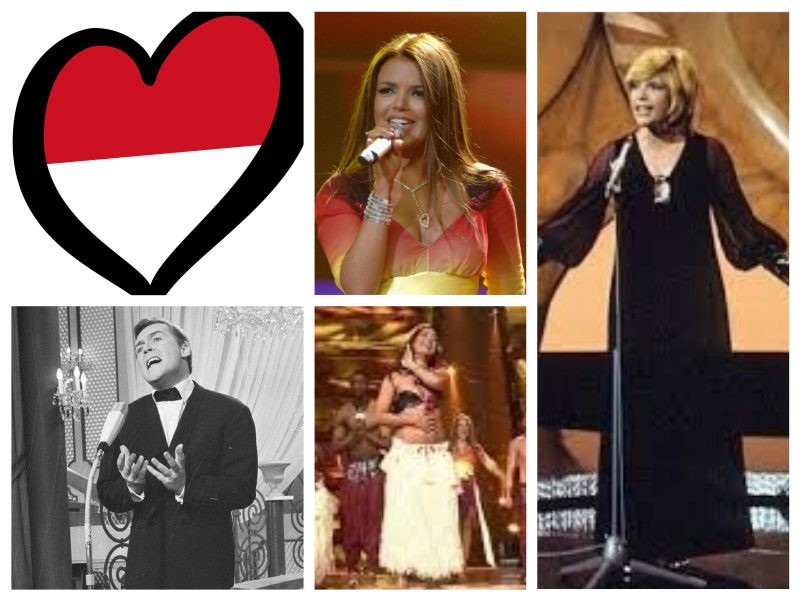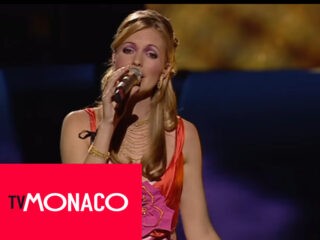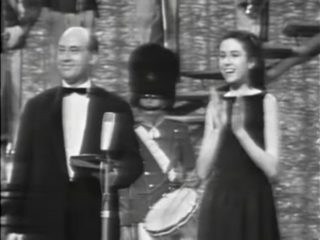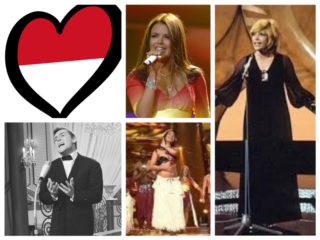Last year we ran a series of articles detailing the “10 reasons” that we love every country at Eurovision. This year we’ve decided to focus on the countries that are no longer participating. Their departures gave us sad face, but the thought of their return — no matter how unlikely — makes us smile big. Next we turn our attention to Monaco. The world’s second smallest country was a staple of the contest in the early early days, but has since faded into non-participation. They returned briefly in 2004, but failed to reach a final and left — seemingly for good — in 2007. However, their mark on Eurovision history can’t be disputed. So let’s look at 10 reasons why we loved Monaco at the Eurovision Song Contest.
1. The original microstate
While Andorra and San Marino certainly have impacted the contest in recent times, Monaco was the trailblazer for microstates. They first participated way back in 1959 with Jacques Pills singing “Mon ami Pierrot”. Jacques was the father of Jacqueline Boyer, the winner of the contest the following year, and was briefly married to Edith Piaf. Unfortunately, he got the polar opposite result of his daughter, finishing last in the contest. Monaco is one of eight countries to finish last on debut, but that didn’t stop them coming back for more.
2. They were something of a powerhouse
It’s hard to believe nowadays that a microstate could be a powerhouse in the contest, but Monaco were certainly that. Their second year of participation was much more successful, with a solid third placing with Francois Deguelt and “Ce soir-la”. Two years after that, they went one better, finishing second out of sixteen countries, again with Francois Deguelt and “Dis rien”. Francois Deguelt stands alongside the likes of Cliff Richard, Chiara and Zeljko Joksimovic as singers who have finished both second and third. Monaco regularly made Top 10 results throughout their history, and finished in the Top 4 five times throughout the 1970s. We’d love to see San Marino get that kind of success!
3. La langue francais
The early days of Eurovision were certainly a Francofest. And Monaco, alongside France and Luxembourg, loved to bring the chansons. All of Monaco’s conductors were French, and all of their singers except for two were born in France. Even the two that weren’t (Croatian Tereza Kezovija and Italian Mary Christy) sang proudly in French for Monaco. Mary Christy’s song “Toi, la musique et moi” came third in 1976 and remains a fan favourite. Monaco’s Eurovision history is a great place to find some great French music.
4. They proved a microstate could win
Monaco’s successful Eurovision history wouldn’t be complete without a win. And that they did in 1971. Severine sang “Un banc, un arbre, une rue”, a fantastic French chanson about the loss of childhood. The song is notable in Eurovision history in that the composers and singer had no relation at all to the country they represented. Yves Dessca is one of only five songwriters to have won the contest twice, having also written the following year’s winning entry “Apres toi” for Luxembourg. 1971 was the first of the three years of the contest where the winner was determined by a peculiar voting system, involving two jury members of each country ranking each song out of five. Both Spanish jurors were unimpressed with the song, rating it 1/5, but six other countries gave it the maximum ten points to secure its victory.
5. Bringing youth to the contest
Monaco also holds the interesting title as being the first country to be represented by a child singer. In 1969, twelve-year-old Jean Jacques sang “Maman, Maman” and gave Monaco a respectable sixth place. Of course, there have been more child singers at Eurovision, including one winner (13-year-old Sandra Kim for Belgium). But with the developing contest being more and more competitive and unsuitable for kids, the age limit of sixteen was eventually introduced.
6. Not forgetting about us
Despite success in the contest, Monaco said farewell in 1980. The reasons are still unknown, but the contest was definitely changing from what it was in the 60s and 70s. After over twenty years of no participation, it looked sadly unlikely that they would ever return. But in 2004, return they did. 16-year-old Maryon was selected to represent Monaco with “Notre planete”, a song with a nice environmental message. Sadly, the long-awaited comeback wasn’t a success. They only received ten points and didn’t make it beyond the semifinal. But it was still great to welcome Monaco back into the Eurovision family. And I really like the song.
7. Bringing in the Pacific flavour
Which country brought the Tahitian language to the Eurovision stage? Monaco of course! Severine Ferrer was internally selected to represent Monaco in 2006, perhaps chosen for her name. She sang the spectacular and unique “La Coco Dance” in Athens. The song is undeniably catchy and memorable, but also failed to get through to the final. It’s not massively surprising. Still, it got eight points from France, and remains a decent guilty pleasure.
8. Microstates are beloved by Eurovision fans
After three years of less than stellar results, Monaco withdrew again in 2007. It’s thought that they, like many Western European countries, felt that the contest has become more about the show and the politics than the music. Even these days, there’s a general belief that smaller countries can’t do well at the contest. While definitely no microstate has come close to repeating Monaco’s early success, that hasn’t stopped us loving them. San Marino’s Valentina Monetta is a sweetheart of the contest. Andorra’s Marta Roure and Gisela are also fan favourites. And if only the televote was counted, Serhat would’ve bagged a Top 10 result for San Marino. There is love and life out there for microstates, and Monaco would definitely get a lot of that.
9. A contest hosted in Monaco would be amazing
Sadly a lack of budgeting and planning meant that their 1971 victory didn’t lead to the 1972 contest being hosted in Monaco. We got to see to date the only Scottish hosted contest, but it wasn’t quite the same. Times had moved on by then, and while the idea of a microstate hosting the contest still seems unlikely, it’s still a Eurovision fan’s dream. Monaco is an incredibly rich country and an amazing tourist hotspot. It has everything from casinos to museums to Formula One. And it’s hard to believe that money could be an obstacle for the country to put on a spectacular show. The only way we’re going to know for sure about whether this dream is realistic is if Monaco repeats what they did in 1971. So: Monaco, we love you, and we’d love to see you back on stage!
10. Boum-Badaboum
Let’s conclude this list with a song that’s probably played in more Eurovision montages than I could possibly remember. Serge Gainsborough’s foray into Eurovision is mainly remembered with “Poupee de cire, poupee de son”, but that wasn’t his only participation. In 1967, Minouche Barelli sang “Boum Badaboum”, written by Serge himself, and came 5th. The song was catchy as all hell and deserved to do well, but it was actually a bit of a statement on the contest itself. There was a belief that with so many languages competing against each other, one of the only ways to stand out and be understood was to send a song that had nonsense lyrics that everyone could understand. Serge made fun of this, and the song “Boum Badaboum” is actually about the desire to live a full life before being killed in a bomb attack. Truly in a league of its own. Monaco, how we miss you and your amazing history.
What was your favourite moment from Monaco in Eurovision? Do you want to see them return? What do you hope they’ll bring to the contest? Let us know below!











I thought the 1972contest wasn’t held in Monaco for lack of a suitable venue.
I’m Polynesian and I hate the 2006 Monaco’s performance and song. This is not how real tahitian dancers dance (it ashames me). It makes me mad to see European people singing in a language they don’t master and that they showed to millions of people a culture they weren’t from and they truly didn’t know. Plus the song’s theme is so stupid (“Coco dance” ? Really ?!) . Real people from Tahiti would have make this performance better dancing their own dances, and above all, singing in tahitian an other song with a theme less stupid than “coco dance”.
Yes they do, what kind of dumbass comment is this?
« This is not how real tahitian dancers dance »
Mako my (Wo)Man, visibly you don’t know what fuels my Eurovision peoples. Suffice it to see how they slobber on every overcooked, oversugarish rehashed ‘song’ coming from Sweden year after year after freakin’ year to understand that my Eurovision peoples don’t want real. They want, hell, they LOVE fake fake fake unoriginal. Now repeat after me : Say NANANA !
Thank u, next
Plus, my comment has nothing to do with Sweden. Leave the Swedes out of this story please. I very much like what they are doing at Eurovision.
‘that performance has never sat well with me. It feels like a European tourist’s interpretation of Tahitian music. Fun as a memory of a nice holiday, but little to actually do with Tahitian culture’. Finally someone who can understands me ! Thank you 🙂
And I agree a lot with the second part of your comment 🙂 (*yeah it would be so cool to see New Zealand artists on stage at Eurovision)
Of course. It is so obvious. What a smart comment from you …
So so. I got 4 unlikes for telling my thoughts about the 2006 Monaco song and performance 🙁
*dislikes ^^
And an epic debut it was. In the rare genre of ‘Schlager Rock’ (yes that exists). He came last, but as you have stated his daughter won the year later so he got redemption 🙂 Great article
Song from 1967 deserved TOP 3, song from 2005 deserved final, and TOP 10 in final. I think with this system of voting from 2016 would be in final 2005
I think Monaco could conceivably host in the unlikely event of another win. They have a venue, and have hosted those World Music Awards for years. I’m sure they could probably attract sponsors to pay for it too, considering how much large corporations love tax havens. It’s a shame they didn’t manage it in 1972.
Diet France, but they were fine. Every micro nation ought to remember that the smallest internationally recognized country in Europe walked off with at least one win.
Vatican: Am I a joke to you?
Yes, a big one.
I’m not really keen on Monegasque entries, but there’s one I really love, and it’s “L’amour S’en Va” by Francoise Hardy from 1963 – a timeless and calming tune from a talented and established artist. Not her best work, but a great song nonetheless.
Good luck finding 10 reasons why you loved Morocco in Eurovision XD
1. They were the first (and so far the only) African state to participate in Eurovision
2. They added Arabic to the Eurovision languages family
3. They didn’t fear sending well-known singers to Eurovision
4. They really loved Turkish entries
5. They brought an oriental flavour to the contest
6. They are the only ESC country to take a part just once.
7. They redefined the term “pyjama realness”
8. They never came last.
9. They were appreciated by the Italian jury.
10. They’re the nation fans are waiting the longest to come back.
11. A lot of Morrocan singer participated in ESC
12. Morocco would make ESC richer rather than Israel.
13. A member of the Moroccan diaspora won Eurovision.
🙂
I think James is talking about Loreen 🙂
Wow you got me on that one lol
Eurovision has a long story of onomatopoeias and “Boum-Baddaboum” may be my favorite use of it. Minouche’s sassy attitude is just perfect for the song.
It’s a close one, but I’d choose the Netherlands from the same year, probably the closest thing to a Christmas song we’ve seen at Eurovision.
Another charming entry from that year. That indeed sounds like a Christmas song!
I love it too! It is still frighteningly relevant. I love Serge Gainsbourg…
ABBA gets a lot of (deserved) credit for bringing pop music to Eurovision, but Gainsbourg’s entries in the 60’s were very advanced to a contest where most of the entries were traditional “chansons” and everybody was very well behaved both on the stage and on the audience.
One reason: Their 2005 entry should have competed for the victory instead of crashing and burning in the semi final. Like, WTF? I’d rather have had Monaco money buy that wonderful entry a victory instead of those that actually bought it in 2011.
Well said sir! This is one of the best comments I ever read on Wiwi.
Thank you!
Luxembourg is also a micro-state. And I want both of them to return.